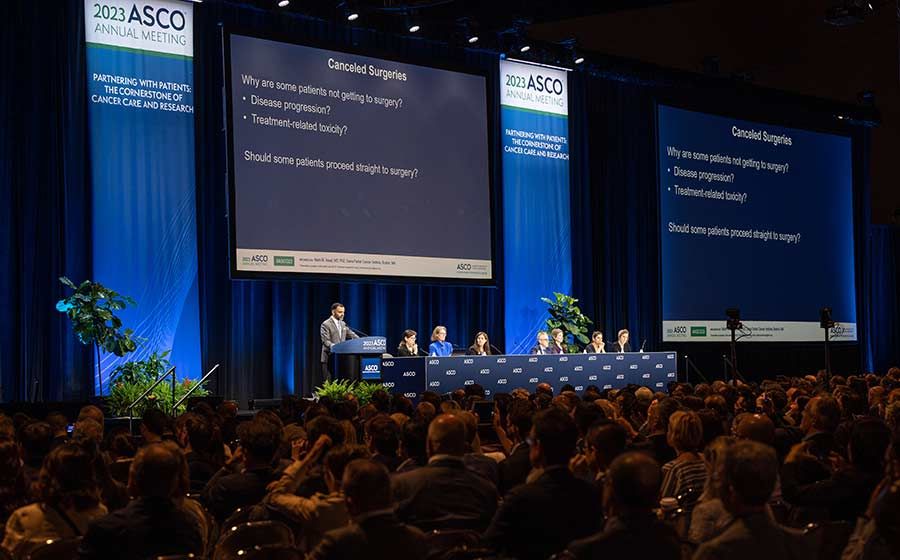
Breast cancer news from this year's ASCO
In June, many Danish oncologists participated in the annual international congress, ASCO, where a myriad of novelties in cancer treatment were presented.
The American organization Breastcancer.org highlights here some research projects that have a perspective for the future and that breast cancer sufferers should take note of.
CDK4/6 inhibitors combined with aromatase inhibitor give good results
Two CDK4/6 inhibitors have a good effect on hormone-sensitive and HER2-negative early-stage breast cancer. The one CDK4/6 inhibitor is being tested in the so-called NATALEE project, where in a clinical phase III study the effect and safety of ribociclib combined with antihormonal treatment (aromatase inhibitor) is compared to standard antihormonal treatment alone. This means that a group of breast cancer patients will be treated by lottery with a combination of the two drugs, while another comparable group will be treated with standard antihormonal treatment.
The trial, which is an international multicenter trial, includes 5,000 patients in all age groups and shows that if you treat early breast cancer of the hormone-sensitive type, HER2-negative breast cancer with the CDK4/6 inhibitor ribociclib combined with the aromatase inhibitor, you reduce the risk of relapse by 25 percent in addition to the benefit when treated with the aromatase inhibitor alone. This combination can keep breast cancer patients cancer-free without affecting everyday life. HR-positive HER-negative breast cancer accounts for 70 percent of all breast cancer cases.
The other CDK4/6 inhibitor, abemaciclib, is shown to provide good results for people with early hormone-sensitive breast cancer regardless of age. In the so-called monarchE phase III trial, breast cancer patients over the age of 18 who have early, hormone-sensitive and HER2-negative breast cancer with spread to the lymph nodes are included.
The latest results from this trial show that abemaciclib combined with anti-hormone therapy after breast cancer surgery reduced the risk of recurrence more than hormone therapy alone, regardless of the person's age. The results also show that in trial participants who, due to side effects, received a lower dose of abemaciclib, the result was the same, so a lower dose of abemaciclib reduced the risk of relapse at the same level.
Box CDK4/6 inhibitor
The drugs inhibit some proteins called CDK 4 and 6. These proteins are abnormally active in certain types of breast cancer and cause the cancer cells to grow uncontrollably.
Ovarian function is suppressed
A so-called meta-analysis (combining and analyzing results from a number of previous studies) shows that suppressing ovarian function reduces the risk of recurrence and death by about 18 percent in women with breast cancer who have not yet gone through menopause. The meta-analysis included results from 25 clinical studies involving 14,999 women.
Best to take tamoxifen in the evening
A study shows that you get better results from the treatment if you take antihormonal treatment of the tamoxifen type in the evening rather than in the morning. The study also showed that the same does not apply to aromatase inhibitors – here it does not matter what time of day you take the medicine.
HER3-DXd shrinks several types of breast cancer nodules
About 60 percent to 70 percent of breast cancers are HER3 positive. HER3 plays a role in both the development of cancer nodes and resistance to treatment. HER3 was discovered more than 30 years ago, but until now there are no drugs that act on HER3 approved for the treatment of breast cancer. Today, it is known that HER3 plays an important role in the development of breast cancer, and more and more clinical trials are taking place with drugs targeting HER3. One of the drugs targeting HER3, HER3-DXd, has been shown to give good results in treating people with metastatic breast cancer. HER3-DXd reduces the size of cancer nodules in several types of metastatic breast cancer that have developed when the cancer was treated with other drugs. This applies to both types of hormone sensitive, triple negative and HER2 low breast cancer. Side effects of this drug also appear to be less severe. HER3-DXd has not yet been approved by the US Food and Drug Administration (FDA).